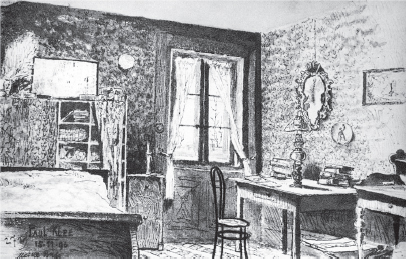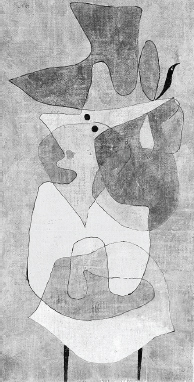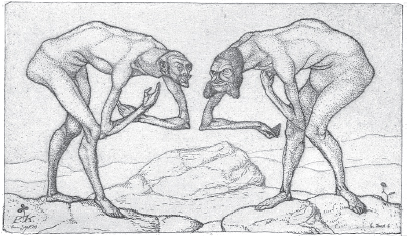The Storyteller (8 page)
Authors: Walter Benjamin

Still Story

My Room (Meine Bude)
, 1896.
TOLD ON THE OCCASION OF MY MOTHER'S BIRTHDAY
A
D-train passed through a rainy landscape. A student sat in a third-class carriage. He was returning from Switzerland, where he had spent a few expensive and rain-filled days. With a certain tender care, he let his feelings rest and sought to summon up a mild sense of boredom. Sitting in the yellow coupé was an older gentleman and beside him a lady in her sixties. Unthinkingly, the student stared at them for a minute, then got up and went slowly into the corridor. He looked through the glass panes of the compartments and noticed a
female student from his university with whom he was besotted â silently until now, as was his custom with such matters in their early stages. And as he saw her, he could not help feeling that this was quite natural. With the air of someone who had acted judiciously, he returned to his compartment.
In the evening, around nine thirty, the train pulled into the university town. The student got off without looking back. When, soon after, he saw the female student lugging a big black suitcase ahead of him, he approved of this scene as being quite natural. The memory of rainy Swiss days began to fade.
He made little effort to follow her through the station, this female student whom he was in love with (âafter all â in love', he remarked to himself). Without a doubt she would wait with her suitcase at the tram stop. And indeed: there she stood with a few other passengers. A fine rain was falling. The tram came (not his line, as he noted), but there is nothing more unpleasant than waiting in the rain. The female student embarked at the front, and the conductor stashed her heavy suitcase. The dark mass of this suitcase had something fascinating about it. How spectral it looked, rising from the platform! As the tram began to move the student stepped onto the front platform.
They were the only two. The rain relentlessly showered his face. She stood beside her suitcase, wrapped in a thick travel coat in which she looked ugly â like some plaid monstrosity. The tramcar moved quickly; few people got on. They travelled to a distant district which was almost a suburb. Vexation rained down on the student like drizzle from the wet clouds. Slowly he worked himself up into a rage. He felt hatred for the administration, which had steered the tram into this distant area. Hatred for the darkened streets with windows in which lights were flickering. A glowing, passionate hatred of the vile, unfitting rainy weather. He wrapped himself in his coat and
decided not to speak, not a word. For he was not the slave of this woman in the monstrous raincoat. Oh no!
The tramcar was moving very quickly. A sense of sovereignty came over him and he began to plan a work of poetry.
Then he thought nothing except: I just want to see how far she will travel.
Two minutes later the tramcar stopped. The lady got off and the conductor reached for her suitcase. This awoke the young man's jealous fury. He grabbed the suitcase without saying a word, alighted from the tram and began following her. He had walked a hundred paces behind her when, upon perceiving an elastic gesture of her head, he felt compelled to recount to her a few words about the time and the weather, by way of apology, as it were.
At that moment he saw the young girl stop before a door. He heard the key turn in the lock and saw the darkness of an entrance hall with barely enough time to utter an inaudible âGood evening', before handing over the suitcase to the female student. The door slammed shut. He heard it being locked from the inside. With his hands deep in his coat pockets he walked uprightly into the rainy darkness, with one word playing on his mind: âluggage-carrier'.
â
Translated by Sebastian Truskolaski
.
Written c. 1911â12; unpublished in Benjamin's lifetime.
Gesammelte Schriften VII
, 295â6; also translated in
Early Writings
, 85â7.
The Aviator

Hat, Lady and Little Table (Hut, Dame und Tischchen)
, 1932.
T
he empty marble table reflected the arc lamps. Günter Morland sat in front of a café. The cold grenadine made his teeth hurt. Violin sounds came from inside, as though bright spiritual voices were storming irritably towards their goal.
âWhy did you sleep with a woman? It was a girl, it was a prostitute. Oh Günter, you were pure.'
An old woman made a fuss as she sought a space among the empty chairs. Günter examined her tiny body with interest. One could have twisted off her neck, that's how thin she was. The waiter cheated him when he paid the bill. He pushed himself into the stream of people on the boulevard. Every evening the sky was a milky brown, the small trees were black, and the doorways to the amusement halls were dazzling. He was spellbound by the jewellers' shops. With the golden knob of his walking stick buttressed against his hip, he would pause in front of the window displays. For minutes at a time he observed the hats at a milliner's shop and imagined them on the heads of women in full make-up.
He was met by a gust of perfume that came from four women. They edged their way through the crowd and Günter followed them unashamedly. Well-dressed men turned their heads after these women; newsboys squawked after them. With a hiss, an arc lamp flared up and illuminated the hair of a slender blonde. The women huddled together. As they turned around, Günter approached them with wavering steps. The girls laughed. Stiffly, he went past them and one of the women pushed her arm against him, making him hot. Suddenly he appeared in the brightness of a mirror which reflected the lights. His green tie was glowing; it sat well. But he saw himself looking dishevelled amid the lights. His arms hung limply at his sides. His face appeared flat and red, and his trousers hung in deep folds. Shame had befallen his body in all its limbs simultaneously. A stranger surfaced from the depths of the mirror. Günter fled with his head bowed.
The streets were empty and the voices rang sharply, all the more so now that it was dark. Günter Morland was astonished that during these last twenty-four hours he had not yet
succumbed to some debilitating disease. He steered well clear of other people and yet kept his eye on them.
At around eleven at night, he found himself in a square and noticed a crowd of people with upturned heads looking at the sky. In a circle of light above the city there drifted an aeroplane, black and jagged in the pinkish mist. It seemed as if one could hear its quiet rumbling, but the aviator remained invisible. He steered an even course, almost without accelerating. The black wing hovered sedately in the sky.
When he turned, Günter had to sharpen his gaze to make out the prostitute he had slept with. She did not notice the look in his childlike eyes as he took her by the arm assuredly.
â
Translated by Sebastian Truskolaski
.
Fragment written c. 1911â12; unpublished in Benjamin's lifetime.
Gesammelte Schriften VII
, 643â4; also translated in
Early Writings
, 126â7.
The Death of the Father
Novella

Two Men, Each Suspecting the Other to be of Higher Rank, Meet (Invention 6) (Zwei Männer, einander in höherer Stellung vermutend, begegnen sich [Invention 6])
, 1903.
D
uring the journey, he avoided thinking about the real meaning of that telegram: âCome immediately. Turn for the worse.' In the evening, in bad weather, he had left the town on the Riviera. Memories surrounded him like morning light bursting in upon a late carouser, sweet and shaming. Indignantly he heard the sounds of the city, whose midday he had entered. Feeling upset appeared to him to be the only response to the annoyances of his hometown. But he harboured a chirruping lust for those hours he had whiled away with a married woman.
His brother was standing there. And, like an electrical shock running down his spine, he despised this black-clad figure.
The brother greeted him hastily with a despondent look. A car stood waiting. The drive was rattly. Otto stammered out a question, but the memory of a kiss enraptured him.
Suddenly the maid was standing on the steps of the house, and he broke down as she took his heavy suitcase off him. He hadn't yet seen his mother, but his father was alive. There he sat by the window, bloated in his armchair ⦠Otto went towards him and gave him his hand. âYou won't kiss me anymore, Otto?' his father asked quietly. The son threw himself at his father, then ran outside and stood on the balcony, yelling into the street. He grew weary from crying and dreamily began to remember his schooling, his practicum years, the passage to America. âMr Martin.' He composed himself and felt ashamed, knowing his father was alive. As he sobbed once more, the girl put her hand on his shoulder. Looking up mechanically, he saw a healthy, blonde person: the repudiation of the sick man he had touched. He felt himself at home.
In the liveliest quarter of town lay the library that Otto frequented during his two-week stay. Every morning he worked for three hours on a text that was supposed to earn him a doctorate in political economy. In the afternoons he went back to study the illustrated art journals. He loved art and dedicated much time to it. He was not alone in these rooms. He was on good terms with the dignified clerk who issued and received books. When he looked up from his books with a furrowed brow, his mind blank, he frequently spotted a familiar face from his high-school days.
The solitude of these days, which was never idle, did him good after the last few weeks on the Riviera, when all his nerves had been enlisted in the service of a passionate woman. At night in bed he sought the details of her body, or took pleasure in sending her his weary sensuality in lovely waves. He rarely
thought of her. If he sat opposite a woman on the tram he only raised his eyebrows meaningfully, wearing a blank expression â a gesture with which he hoped to solicit unapproachable solitude for sweet inertia.
The activities of the household were steadily focussed on the dying man. They did not bother Otto at all. But one morning he was awoken earlier than usual and led before his father's corpse. It was bright in the room. His mother lay in pieces in front of the bed. The son, however, felt such strength that he took her under the arm and said firmly: âStand up, Mother.' On this day he went to the library as usual. His gaze, when it passed over the women, was even emptier and more impassive than usual. As he stepped onto the platform of the tram, he held close the folder containing two pages of his work.
And yet from this day on he worked with less certainty. He noticed deficiencies; fundamental problems, which until then he had regularly passed over, began to preoccupy him. While ordering books, he would suddenly lose all composure and orientation. He was surrounded by stacks of periodicals in which he searched for the most inane data with absurd meticulousness. When he interrupted his reading, he could never shake off the feeling that he was someone whose clothes were too big. As he chucked the clods of soil into his father's grave, it dawned on him that there was a connection between the eulogy, the endless row of acquaintances and his own thoughtlessness. âThis has all happened so often. How typical it is.' And as he passed from the grave through the crowd of mourners, his heartache became like a thing that one is accustomed to carrying around, and his face appeared to have broadened with indifference. He was irritated by the quiet conversations between his mother and brother when the three of them sat at the dinner table. The blonde girl brought the soup.
Mindlessly, Otto raised his head and looked into her brown, clueless eyes.
In this manner Otto sought to brighten the petty anxieties of these days of mourning. Once â in the evening â he kissed the girl in the hall. His mother always received heartfelt words when she was alone with him. However, for the most part she discussed business affairs with his older brother.
As he returned home from the library around noon one day, it occurred to him that he should leave. What else was he to do here? He had studying to do.
He found himself alone in the house and so went into his father's study as had been his custom. Here on the divan, the deceased had suffered his final hours. The blinds had been lowered because it was hot, and through the slits the sky shone. The girl came in and put some anemones on the writing desk. Otto stood leaning against the divan and, as she walked past, he pulled her towards him silently. As she pushed herself up against him, they lay down together. After a while she kissed him and got up; he did not hold her back.
Two days later he departed. He left the house early. The girl walked beside him, carrying his suitcase, and Otto told her about the university town and his studies. But on parting they only shook hands as the station was crowded. âWhat would my father say?' he thought to himself as he leaned back and yawned the last bit of sleep from his body.
â
Translated by Sebastian Truskolaski
.
Written 1913; unpublished in Benjamin's lifetime.
Gesammelte Schriften IV
, 723â5; also translated in
Early Writings
, 128â31.